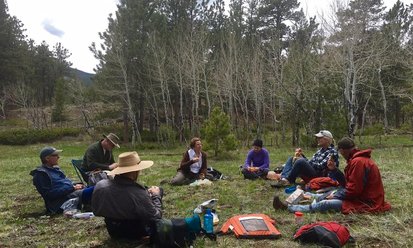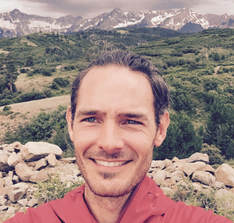|
7/11/2017 Comments Worship as Wild CourtshipBy: Matthew Syrdal  “The heavens are rehearsing the glory of God… Day pours forth speech unto day; night reveals knowledge unto night. They have no speech, they use no words; no sound is heard from them. Yet their voice goes out into all the earth, their words to the ends of the world.” - Psalm 19 I can still smell the pungent perfume of the desert sage congregating below me, rising up from the black depths beneath the canyon rimrock. Their silhouetted arms reach longingly upward toward the heavens. I feel them waiting, silently witnessing the night. The awakened gaze of innumerable stars burns overhead as the face of the moon delicately traces the warm sandstone contours of the canyon rim in a pale light. Alive and in sheer awe, my body stands at the edge of this dark world, vibrating in the stark illuminating gaze of the moon. A sea of darkness yawns open, revealing some other night calling to me in this thin moment. I hear it with my whole being, deep in my cells and bones. A singing. The unending grief of the earth and the longing of the stars calling to each other. Rising together into the night, the fragrance from the bush floor and the song of the cicadas are sown together in a haunting dirge. I listen to these primordial voices as if hearing sound itself for the first time—the sound of innocence in its world-making beauty. Erotic fragrances pour forth in unending praise, harmonizing with the melodic, meditative sounds of these stringed ones. Each note revealing a vaster, older and deeper liturgy—a courtship—that has long preceded human worship. On desert nights like these, I am reminded of the words of Steven Buhner, in Plant Intelligence and the Imaginal Realm, who says, “There is a language in the world, much older than our own. Ours is only a reflection of that older language, our ‘take’ on it, our innovation.” All nature was designed for revelation. At least that’s what indigenous peoples, the Israelites, our church Fathers, and the Celts believed. Jesus himself, like Moses and the prophets Elijah and John the Baptizer, strode deep into the heart of the world, fasting for a vision—revelation. Jesus taught in parables with insights drawn from the seasons using Earth-based imagery. He and his disciples slept out under the stars in olive groves and in desolate places. Rapt in natural revelation. We experience these moments of sheer awe at dawn or dusk, a crisp silent winter-scape, or the delicate burst of a crocus. We feel seismic shifts of changing seasons, of birth and death, alluring us into our own utter contingency, as creatures. And sometimes we lose ourselves in deep rapture with the wild. These are moments of worship with and within the primordial liturgy of the universe itself. It is in these moments when we hear again the Old Language—when we remember. This is the original speech or conversation, the cosmic Sermon that the poets of Genesis and the the Apostle John wrote about—this Logos. The Word is the source, inspiration, and the longing that is worship, is life itself. I have noticed a resurgence of curiosity and interest in the scientific community for the ways in which all self-organized systems, including plants, communicate with each other and their environments. Truly, we live in a relational universe. Gregory Bateson in Mind and Nature develops the insight that growth and differentiation, the shapes of animals, plants and entire ecosystems, are in fact “transforms of messages.” In other words, there is a sacred grammar, a wild poetry, underlying the structural shape and contextual relationships of the visible world. It seems scientists are confirming what the mystics have intuitively perceived all along—there is no primary “stuff”, only a living field vibrating in liturgical harmony. Worship with nature is more than “I-Thou” communication, it is a participation in the cosmic courtship between heaven and earth, the sacred and mundane, the divine and the natural. It is a process we undergo through faith as the Spirit of God tears a hole in our day to day awareness and we see “behind the veil” perceiving the depths of a meaning filled manifold universe. The apostle Paul speaks beautifully of our place in the cosmic liturgy of creation. In Romans 8:19-23, he says, “For the creation waits in eager expectation for the children of God to be revealed… We know that the whole creation has been groaning as in the pains of childbirth right up to the present time. Not only so, but we ourselves, who have the first fruits of the Spirit, groan inwardly as we wait eagerly…” Worship with is a “groaning.” It a longing, filled with grief and joy. As our species continues to destroy other species and ecosystems, we are joined with creation in a collective grief, often deeper than our conscious awareness. But as Jesus says to his disciples, using the natural process of childbirth as an image of the kingdom of heaven, “your grief will turn to joy.” Our participation in worship with the creation is a type of courtship. Courtship is defined as “a period during which a couple develop a romantic relationship, especially with a view to marriage.” Courtship carries a romantic longing that evokes peculiar patterns of behavior. We make ourselves desirable for the other. We allure, entice, them into noticing us. We increasingly reveal deepening hidden reservoirs of beauty and truth about ourselves, so that the other can come to know us, and we them. There is a playfulness to courtship in the way it quietly stalks, allures, entices and persuades through moments of vulnerability and tenderness. Courtship is not a one-way street but a persuasive ebb and flow of longings, revelations, and risks. “The creation,” says Paul, “waits in eager expectation,” like a Lover for the Beloved “to be revealed.” Paul is using metaphor which hearkens back to the mystical and erotic poetry of the Song of Solomon, the language of desire. Author Trebbe Johnson writes of the World as a “waiting lover,” one who awaits our wild courtship with it. As we discover the soul of the world, we discover our own deepest pattern and unique place within it. What if what the Earth needs most from us right now is not to heroically try to ‘save’ it, but to deeply and hopelessly ‘belong’ to it? As poet Rainer Maria Rilke says, “If we surrendered to Earth’s intelligence, we could rise up rooted like trees…” The Earth in its feral beauty and wild wisdom, invites us into courtship through the indigenous Word to relearn what it is to be fully human. By day, I am a Presbyterian pastor at a church in Littleton, Colorado. I have witnessed firsthand a collective sense of burnout, depression, and a profound disenchantment with our cultural climate and political world. I have also noticed a shared, but tacit, capitulation in the dominant culture to some of the realities and forces of our times—a capitulation to a ‘paradise lost.’ With a background in spiritual direction and psychology, I have also spent some years training with an organization called Animas Valley Institute, and have begun integrating Celtic and indigenous theologies and practices into a framework of nature-based wholeness and Self-healing for spiritual leadership development. I have been blessed with friendships from others around the country, including the Wild Church Network, who are also grappling with the longing and urgency for this work. As lead guide for Church of Lost Walls in Denver and WilderSoul, our dream has been to create a living expression of church seeking to journey beyond our walls into wild enchanting thresholds where nature, spirituality, and life meet in wild Courtship and sacred community for the cultivation of greater wholeness in our world. We are not a traditional church meeting outside, we gather on weekend mornings or multiple day retreats and immersions to participate in and partner with creation through learning, worship, meditation and prayer. Through nature-based practices that draw upon the wisdom of sacred narratives and older traditions, we seek to cultivate nature connection and personal wholeness to inspire and guide one another into a culturally creative vision of life within our expanding circles of community, culture, the wild earth, and the great mystery we call God. We worship with the seasons, the elements, the landscapes and living beings around us through wild and embodied liturgy, guided invitation to sacred conversation in solitude on the land, contemplative prayer practices, deep imagery and dreamwork, artistic expression and a variety of authenticity based group work. As any courtship moves with intention towards marriage, "Worship with" not only means our participation with, but also our responsibility for, the natural world. Our participation in the feral beauty of wild landscapes that ravage the soul in moments of ecstasy, the tenderness of our own watersheds which nurture life, evokes responsible compassion. A long-suffering commitment to and action on behalf of, rooted in the very wisdom and patterns of nature herself must guide us in our individual and collective roles and projects in the caring for the delicate web of life nurturing and shaping our innumerable diversity of species. After all, wild nature is the primary matrix from which human nature emerged.  Rev. Matthew Syrdal, is a PC(USA) pastor at Grace Presbyterian Church in Highlands Ranch, Colorado, founder and lead guide of WilderSoul and Church of Lost Walls. Matt is a speaker, artist and writer who has offered workshops around the country and retreats in the front range mountains of Colorado. Matt has studied ancient Rites of Christian Initiation, Celtic spirituality, world religions & mythology, ecojustice, and will be completing training through Animas Valley Institute as a nature-based human development guide. Matt has spent several years developing Celtic and indigenous Christian practices oriented towards nature-based wholeness, leadership and ecojustice through retreats, and group immersions, for the cultivation of greater healing, vision and action.
Comments
|
Disclaimer
The viewpoints expressed in each reader-submitted article are the authors own, and not an “official Jesus Radicals” position. For more on our editorial policies, visit our submissions page. If you want to contact an author or you have questions, suggestions, or concerns, please contact us. CategoriesAll Accountability Advent Anarchism Animal Liberation Anthropocentrism Appropriation Biblical Exegesis Book Reviews Bread Capitalism Catholic Worker Christmas Civilization Community Complicity Confessing Cultural Hegemony Decolonization Direct Action Easter Economics Feminism Heteropatriarchy Immigration Imperialism Intersectionality Jesus Justice Lent Liberation Theology Love Mutual Liberation Nation-state Nonviolence Occupy Othering Pacifisim Peace Pedagogies Of Liberation Police Privilege Property Queer Racism Resistance Resurrection Sexuality Solidarity Speciesism Spiritual Practices Technology Temptation Veganism Violence War What We're Reading On . . . White Supremacy Zionism ContributorsNekeisha Alayna Alexis
Amaryah Armstrong Autumn Brown HH Brownsmith Jarrod Cochran Chelsea Collonge Keith Hebden Ric Hudgens Liza Minno Bloom Jocelyn Perry Eda Ruhiye Uca Joanna Shenk Nichola Torbett Mark VanSteenwyk Gregory Williams Archives
October 2017
|
Search by typing & pressing enter

 RSS Feed
RSS Feed